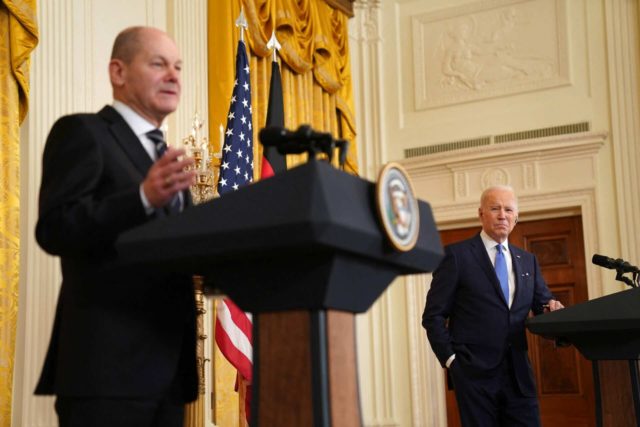
Biden vows to end German-Russian gas pipeline if Ukraine is invaded German Chancellor Olaf Scholz participates with U.S. President Joe Biden. (Leigh Vogel/Pool/Abaca Press/TNS)
President Joe Biden, alongside Germany’s new chancellor, pledged Monday that their two nations are “united” in their efforts to deter Russia from invading Ukraine following their first formal meetings at the White House.
Strikingly, Biden promised he and other allies would “bring an end” to the controversial Nord Stream 2 natural gas pipeline connecting Russia and Germany if Russia attacks its neighbor, a former Soviet republic. “If Russia invades, there will no longer be a Nord Stream 2,” Biden said during a news conference after two hours of talks with German Chancellor Olaf Scholz.
But even as Scholz and Biden sought to convey a united front, the German leader would not explicitly back up Biden’s threat. He promised only there would be no daylight between Germany, which controls the pipeline, and its NATO partners.
“We will be united. We will act together,” said Scholz, whose commitment to deterring Russian aggression had been in recent weeks questioned by allies in light of his reluctance to send serious military aid to Ukraine and past comments suggesting that Nord Stream 2, as “a private project,” might not be sanctionable.
“All the necessary steps will be taken by us together,” he said.
When a German reporter asked Scholz why he wouldn’t try to put to rest nagging questions about Germany’s reliability as a NATO ally by explicitly backing up Biden’s threat to halt Nord Stream 2, Biden stepped in to dispel any sense the two leaders weren’t aligned.
“Germany’s completely reliable,” Biden said. “I have no doubt about Germany.”
The public show of unity continued Biden’s ongoing effort to bolster the NATO coalition in response to the aggression by Russian President Vladimir Putin, who has amassed more than 100,000 troops on Ukraine’s borders in preparation for a possible invasion. Biden and Scholz were clear in expressing their broad agreement on a two-track approach of diplomacy and deterrence.
Although both agreed a diplomatic resolution is their preferred outcome, Biden warned of “swift and severe consequences” if Russia attacks. “We’re in agreement that it cannot be business as usual if Russia invades,” he said.
His repetition of several statements affirming their agreement offered perhaps the clearest signal of the lingering unease among allies, and the importance of conveying to Putin above all others that NATO’s two strongest powers remained committed.
“The bottom line is this: Germany and the U.S. are close friends and reliable partners and we can count on one another,” Biden said. He stated that the two leaders are aligned on the importance of deterring Russian aggression and upholding “the long-standing democratic principles of the rules-based international order.”
Scholz, a former finance minister under Angela Merkel, brought little international security experience to the chancellorship when he succeeded her in December. On his first visit to Washington as chancellor, he also worked to allay concerns that Germany, a pillar of the trans-Atlantic alliance in recent years, was suddenly a weak link.
Germany’s leadership was criticized last month by allies and Germans for only sending a shipment of 5,000 helmets as its main contribution to Ukraine’s defense.
Germany’s ambassador to the United States sent a frantic memo back to Berlin last week advising Scholz that Washington was questioning its ally’s reliability and that many Republicans believe, she wrote, that the new chancellor is “in bed with Putin.”
“We’re in a very difficult situation,” Scholz told reporters, calling the Russian troop buildup “a serious threat to European security. … If there was a military aggression against Ukraine, this will entail severe consequences that we have worked on together.”
While eagerly conveying a shared commitment to the alliance and to Ukraine’s defense, Scholz and Biden worked during their Oval Office meeting to bridge real differences when it comes to Ukraine — specifically, Germany’s reluctance to contribute to the country’s military defense and the circumstances that would trigger economic sanctions.
Initially upon taking office, Scholz had seemed to waver on sanctioning the Nord Stream 2 natural gas pipeline, calling it a “private-sector project,” but eventually shifted his stance in January and, aiming to quell widespread criticism, said that “all options” were on the table.
On Sunday evening, Scholz gave a lengthy interview to The Washington Post reiterating that stance and stating that NATO’s response to any Russian aggression would be “united and decisive” — a clear public relations push that offered another sign of his deliberateness in working to restore his credibility on this trip to Washington.
Biden’s meeting with Scholz occurred just as French President Emmanuel Macron sat down for talks with Putin at the Kremlin in another diplomatic foray aimed at deterring Moscow from going forward with an invasion. U.S. intelligence officials have predicted that Russian forces will swiftly overtake Ukraine’s military in an assault that will almost certainly result in high civilian casualties.
Biden, during the news conference, said he thought “it would be wise (for American citizens in Ukraine) to leave the country.”
NATO allies have thus far been unable to convince Putin that invading Ukraine is not worth the pain of the resulting economic sanctions.
They have stated that those sanctions would be far more consequential than what allies imposed in 2014 after Putin’s annexation of Crimea.
Putin has continued to seek guarantees from NATO that it will never admit Ukraine into the long-standing alliance that, under Article V of its charter, considers an attack against one member nation an attack against all.
Ironically, the U.S. and other member states are deeply reluctant to admit Ukraine and thus guarantee its military defense. So far, they have also refused to say that to Putin, stating instead that it’s a decision all member nations could consider down the road and refusing to promise that Ukraine would never be admitted.
___
© 2022 Los Angeles Times Distributed by Tribune Content Agency, LLC




